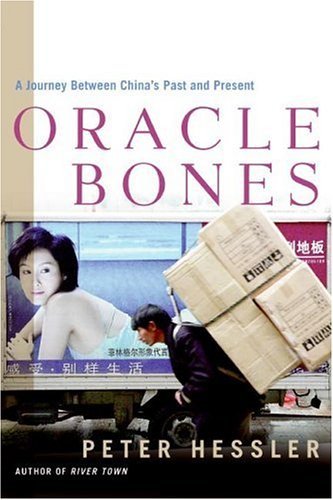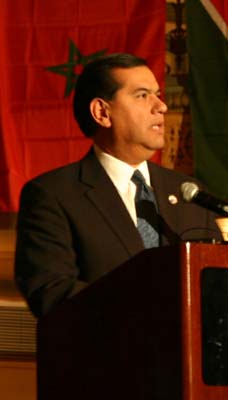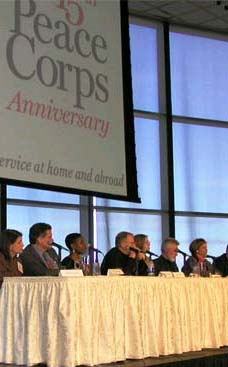2006.04.28: April 28, 2006: Headlines: COS - China: Writing - China: Yahoo: David Lynch writes: Those who seek to understand the real China - rather than the cartoonish threat - would do well to pick up China RPCV Peter Hessler's Oracle Bones
Peace Corps Online:
Directory:
China:
Special Report: China RPCV and Author Peter Hessler:
2006.04.28: April 28, 2006: Headlines: COS - China: Writing - China: Yahoo: David Lynch writes: Those who seek to understand the real China - rather than the cartoonish threat - would do well to pick up China RPCV Peter Hessler's Oracle Bones
David Lynch writes: Those who seek to understand the real China - rather than the cartoonish threat - would do well to pick up China RPCV Peter Hessler's Oracle Bones

"He shows us ordinary Chinese living in an extraordinary time and offers well-sculpted vignettes about a Chinese movie star staging a comeback after getting into political trouble, Mao Zedong's abortive efforts to replace Chinese characters with a Westernized system, and Beijing's plans for the 2008 Olympics."
David Lynch writes: Those who seek to understand the real China - rather than the cartoonish threat - would do well to pick up China RPCV Peter Hessler's Oracle Bones
'Oracle Bones': China revealed
By David J. Lynch, USA TODAY Fri Apr 28, 6:53 AM ET
It's hard to think of another country that will have a greater influence on the future of Americans - and their children - than contemporary China. Yet Americans get precious little help trying to understand the historic transformation the Chinese are undergoing and its implications for the USA.
Politicians parrot empty slogans about economic diplomacy while television polemicists such as CNN's Lou Dobbs fulminate about the evils of "Communist China." No one sheds much light on the country and people behind the talking points.
Those who seek to understand the real China - rather than the cartoonish threat - would do well to pick up Peter Hessler's Oracle Bones. It offers an intelligent rumination on China, both ancient and modern.
Hessler (River Town: Two Years on the Yangtze) deftly illuminates the pressures weighing on today's Chinese leaders: restive ethnic minorities chafing under Beijing's rule, waves of rural migrants seeking better lives in the cities, and the absence of anything resembling the unifying ideology of the years after the 1949 Revolution.
He shows us ordinary Chinese living in an extraordinary time and offers well-sculpted vignettes about a Chinese movie star staging a comeback after getting into political trouble, Mao Zedong's abortive efforts to replace Chinese characters with a Westernized system, and Beijing's plans for the 2008 Olympics.
Hessler, who went to China in 1996 to teach English for the Peace Corps and later became The New Yorker's Beijing correspondent, has a gift for graceful first-person storytelling that doesn't belabor the pronoun "I." Unlike many resident correspondents, he is fluent in written and spoken Chinese.
The Oracle Bones of the title refers to artifacts discovered in the late 19th century that are believed to represent the first evidence of writing in East Asia. During the Shang Dynasty, which began almost 3,800 years ago, turtle shells and cattle scapula were the parchment of the day. Chinese characters identical to those used today were painstakingly assembled into sentences on the bones' surface.
But the writing came only after Shang kings had split the bones with a heated rod and then tried to divine from the resulting cracks what their ancestors were telling them about the future.
Looking to the past for a hint of what's to come remains a good way of understanding China. Oracle Bones is an excellent place to start.
EDITOR'S NOTE: David J. Lynch was USA TODAY's Beijing bureau chief, 2002-2005.
When this story was posted in May 2006, this was on the front page of PCOL:





Peace Corps Online The Independent News Forum serving Returned Peace Corps Volunteers
 | It's Official: Vasquez nominated to FAO
Exactly one week ago we predicted that Director Vasquez would soon be receiving a major ambassadorship. Today the White House confirmed that Vasquez will be the new Representative to the United Nations Agencies for Food and Agriculture replacing Tony Hall.
PCOL Comment: Director Vasquez, let us be the first to thank you for your service to the Peace Corps, congratulate you on your new appointment, and wish you good luck in your future endeavors. Although we have had our differences over the years and we opposed your nomination in 2001, we think you are leaving a solid legacy of accomplishment and have served the Peace Corps well.
Initiatives and Accomplishments: Vasquez's major initiatives and accomplishments since becoming Peace Corps Director include: an agreement with Mexico in 2003 to host volunteers, sending RPCVs to work domestically in Hurricane relief after Katrina, emphasis on recruitment of minorities and of community college graduates, upgrading Peace Corps' infrastructure especially IT upgrades in the online application tracking process and the Volunteer Delivery System, an emphasis on safety and security of volunteers including the creation of a Situation Room at Peace Corps Headquarters, modifying Peace Corps' "Five Year Rule" for employment, and the expansion of the Peace Corps to its highest level in 30 years. He is the third longest serving Peace Corps Director after Loret Ruppe Miller and Sargent Shriver. |
 | The Peace Corps Library
The Peace Corps Library is now available online with over 40,000 index entries in 500 categories. Looking for a Returned Volunteer? Check our RPCV Directory. New: Sign up to receive PCOL Magazine, our free Monthly Magazine by email. Like to keep up with Peace Corps news as it happens? Sign up to recieve a daily summary of Peace Corps stories from around the world. |
 | Interview with a Hit Man
RPCV John Perkins says that for many years he was an "economic hit man" in the world of international finance whose primary job was to convince less developed countries to accept multibillion dollar loans for infrastructure projects that left the recipient countries wallowing in debt and highly vulnerable to outside political and commercial interests. In this exclusive interview for "Peace Corps Online," Colombia RPCV Joanne Roll, author of Remember with Honor, talks to Perkins about his Peace Corps service, his relation with the NSA, "colonization" in Ecuador, the consequences of his work, why he decided to speak out, and what his hopes are for change. |
 | Peace Corps stonewalls on FOIA request
The Ashland Daily Tidings reports that Peace Corps has blocked their request for information on the Volkart case. "After the Tidings requested information pertaining to why Volkart was denied the position — on March 2 — the newspaper received a letter from the Peace Corps FOIA officer stating the requested information was protected under an exemption of the act." The Dayton Daily News had similar problems with FOIA requests for their award winning series on Volunteer Safety and Security. |
 | PCOL readership increases 100%
Monthly readership on "Peace Corps Online" has increased in the past twelve months to 350,000 visitors - over eleven thousand every day - a 100% increase since this time last year. Thanks again, RPCVs and Friends of the Peace Corps, for making PCOL your source of information for the Peace Corps community. And thanks for supporting the Peace Corps Library and History of the Peace Corps. Stay tuned, the best is yet to come. |
 | History of the Peace Corps
PCOL is proud to announce that Phase One of the "History of the Peace Corps" is now available online. This installment includes over 5,000 pages of primary source documents from the archives of the Peace Corps including every issue of "Peace Corps News," "Peace Corps Times," "Peace Corps Volunteer," "Action Update," and every annual report of the Peace Corps to Congress since 1961. "Ask Not" is an ongoing project. Read how you can help. |
 | PC announces new program in Cambodia
Director Vasquez and Cambodia's Deputy Chief of Mission Meng Eang Nay announced a historic new partnership between the Peace Corps and the Kingdom of Cambodia that will bring volunteers to this Southeast Asian country for the first time. Under King Norodom Sihamoni and Prime Minister Hun Sen, Cambodia has welcomed new partnerships with the U.S. government and other U.S. organizations. |
 | Peace Corps suspends program in Bangladesh
Peace Corps Director Gaddi H. Vasquez announced the suspension of the Peace Corps program in Bangladesh on March 15. The safety and security of volunteers is the number one priority of the Peace Corps. Therefore, all Peace Corps volunteers serving in Bangladesh have safely left the country. More than 280 Peace Corps volunteers have served in Bangladesh since the program opened in November 1998. Latest: What other newspapers say. |
 | Invitee re-assigned after inflammatory remarks
The Peace Corps has pulled the invitation to Derek Volkart to join the Morocco Training Program and offered him a position in the Pacific instead after officials read an article in which he stated that his decision to join the Peace Corps was in "response to our current fascist government." RPCV Lew Nash says that "If Derek Volkart spoke his mind as freely in Morocco about the Moroccan monarchy it could cause major problems for himself and other Peace Corps volunteers." Latest: Volkart reverses stance, takes new assignment in Paraguay. |
 | RPCV admits to abuse while in Peace Corps
Timothy Ronald Obert has pleaded guilty to sexually abusing a minor in Costa Rica while serving there as a Peace Corps volunteer. "The Peace Corps has a zero tolerance policy for misconduct that violates the law or standards of conduct established by the Peace Corps," said Peace Corps Director Gaddi H. Vasquez. Could inadequate screening have been partly to blame? Mr. Obert's resume, which he had submitted to the Peace Corps in support of his application to become a Peace Corps Volunteer, showed that he had repeatedly sought and obtained positions working with underprivileged children. Read what RPCVs have to say about this case. |
 | Why blurring the lines puts PCVs in danger
When the National Call to Service legislation was amended to include Peace Corps in December of 2002, this country had not yet invaded Iraq and was not in prolonged military engagement in the Middle East, as it is now. Read the story of how one volunteer spent three years in captivity from 1976 to 1980 as the hostage of a insurrection group in Colombia in Joanne Marie Roll's op-ed on why this legislation may put soldier/PCVs in the same kind of danger. Latest: Read the ongoing dialog on the subject. |
Read the stories and leave your comments.

Some postings on Peace Corps Online are provided to the individual members of this group without permission of the copyright owner for the non-profit purposes of criticism, comment, education, scholarship, and research under the "Fair Use" provisions of U.S. Government copyright laws and they may not be distributed further without permission of the copyright owner. Peace Corps Online does not vouch for the accuracy of the content of the postings, which is the sole responsibility of the copyright holder.
Story Source: Yahoo
This story has been posted in the following forums: : Headlines; COS - China; Writing - China
PCOL32624
11




















